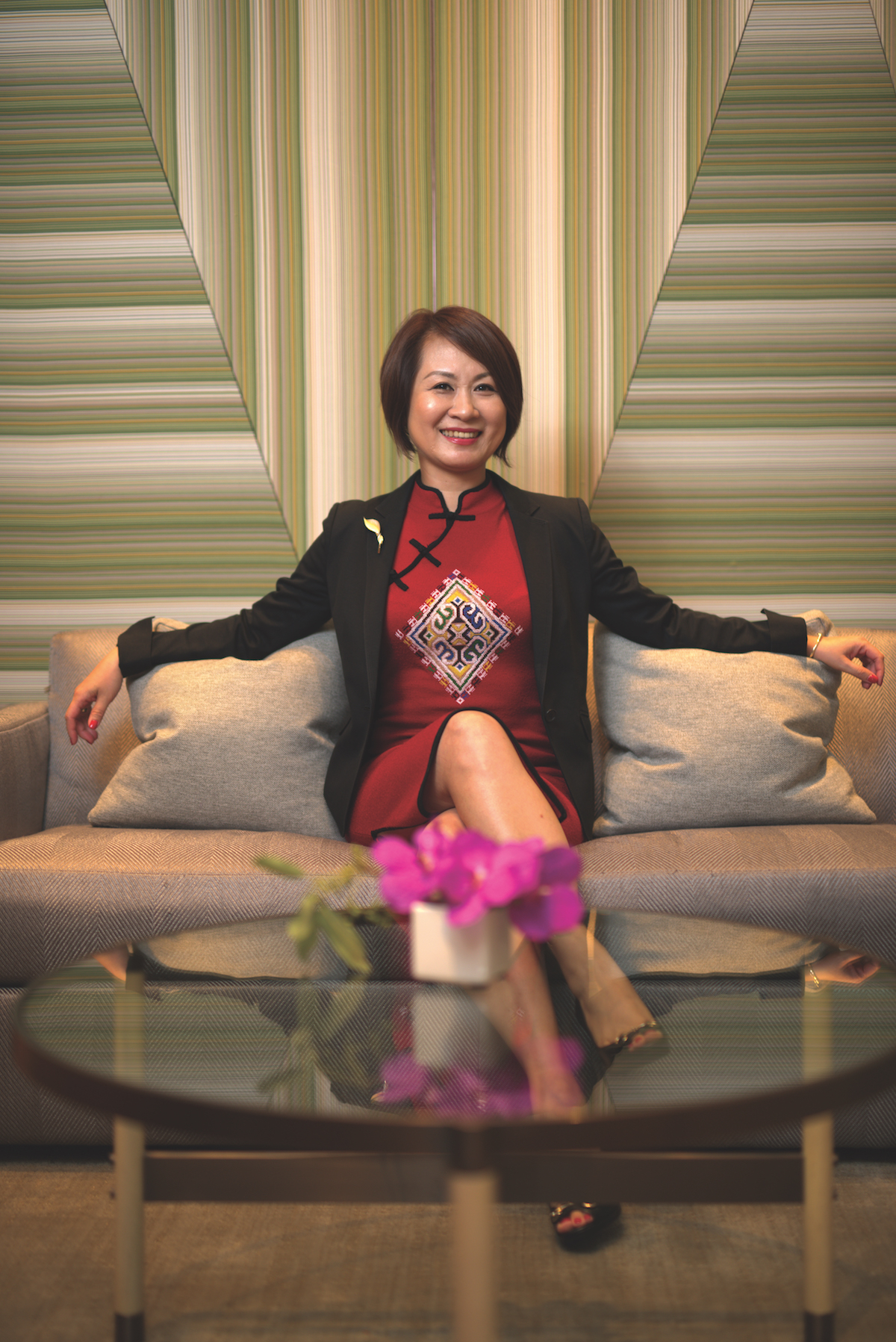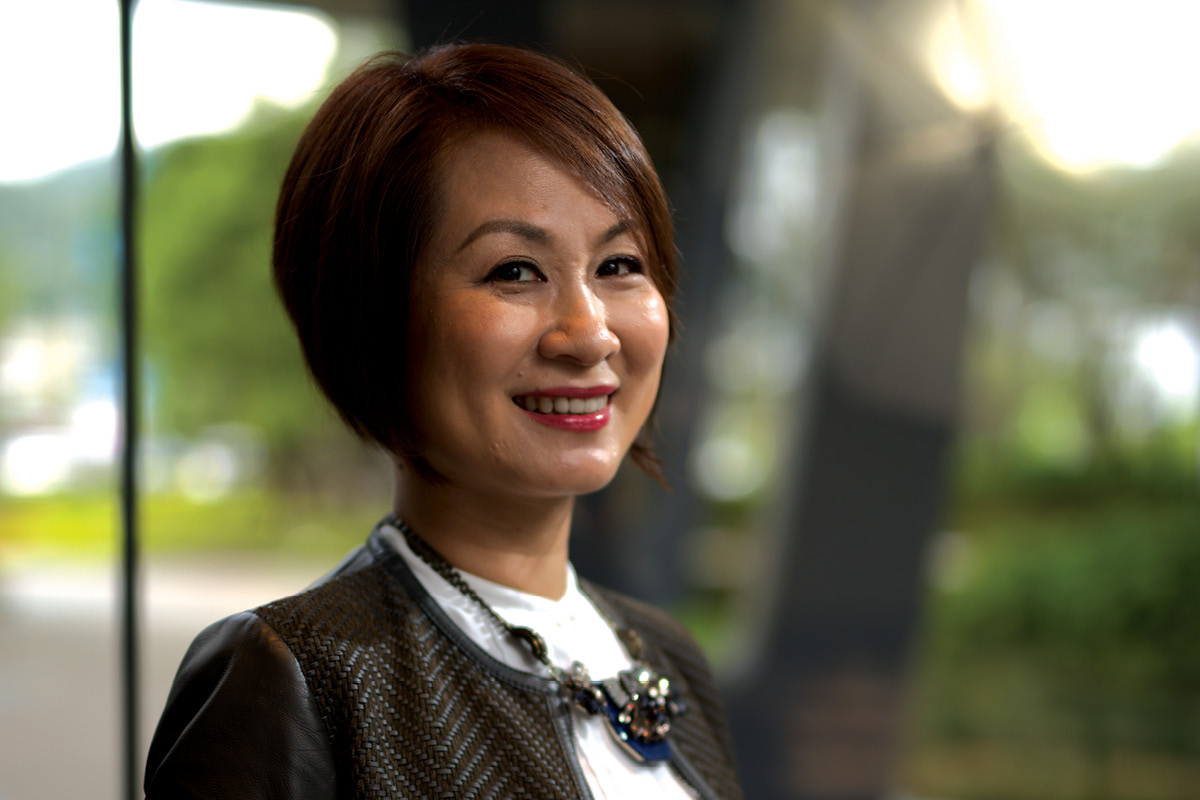For Daphne Tien, the drive to excel started early. Growing up the youngest of four sisters in rural Taiwan, she spent a lot of time with her father, a journalist for the country’s Economic Daily newspaper. The duo would ride around Miaoli County visiting schools. “He wanted to prepare me for the ‘right choice’,” recalls Daphne.
Consequently, at just four or five years old, Daphne announced to her parents that her choice of school was not the local elementary attended by her siblings, but the biggest and most historical school in Miaoli City, a half-hour walk away. She parlayed this kickstart into a place at a prestigious private junior high school. “It cost my family a fortune, but I think it was a good investment – and so do they,” she says with a smile.
Daphne Tien has a passion for learning
The Taiwan of Daphne’s college years, three decades ago, relied heavily on exports of locally made goods. “For a long time, we had the highest foreign exchange reserves in the world,” she explains, “which gave me the idea to major in international trade.”

After graduating from college in Taipei, she became a trainee with a consultancy company in the capital. “That gave me the opportunity to join a lot of courses, mainly in human resources and sales management. I didn’t graduate from a famous university, so I needed to work even harder to be recognised,” she says.
The job cemented Daphne’s work ethic: “I learned that it’s better to have at least two professions, to increase your chances for a successful career,” she says.
So, when a downturn in the economy saw investment in training stagnate, Daphne was quick to return to her passion for learning to boost her odds of finding new challenges.
“I decided to go to the US to study intensive English courses at the University of Central Florida,” she says. “I wanted to improve my English before looking for a better opportunity.”
Working her way up Yageo
Sure enough, on her return to Taipei in 1994, Daphne scored a sales assistant role at electronic component manufacturer Yageo. “It was just going public on the Taiwan Stock Exchange then,” she says. She spent the next 17 years with the company, watching it grow into an international corporation, eventually becoming its head of global distribution.
Early on, Daphne spent three years as country manager in Hong Kong. “It was 1998, a year after Hong Kong returned to Chinese rule, and there had been much uncertainty,” she says. “Two other managers had been sent over two years in a row, but it didn’t work out – there had been years of losses.” Daphne tackled the challenge head-on.
“Most people didn’t speak Mandarin or English, so I learned Cantonese in the first six months, which helped me communicate better.” Within a year, she’d turned the branch office around to make a profit, and the following year she increased revenue tenfold.
In 2000, Yageo acquired components brands from Philips, and Daphne was called upon to help with the merger and subsequent transition to mainland China. “I also worked in Hamburg, Germany, to accelerate their merging into the Asian culture,” she says.
Mouser Electronics provides new challenges
After a decade on the road, she returned home to Yageo’s headquarters in Taipei, where she headed the export sales team and pioneered development of the business around the world. “I was pleased and honoured to reach the first TW$1 billion [New Taiwan Dollar] sales revenue from a single customer just before I left,” she says proudly. “That was a fantastic gift to return to the company I’d worked in for so many years.”
The impetus to move came after Daphne arranged a franchise deal for Yageo with Mouser, a Berkshire Hathaway company. “During the negotiation, Mouser became a very attractive option for me, thanks to its professional business model and straightforward attitude. My decision was made: face the challenge,” she says.
Mouser became a very attractive option for me, thanks to its professional business model and straightforward attitude.
Mouser was looking to expand into the Asian market, and Daphne’s experience of the region was invaluable. But launching a company essentially from scratch comes with its own problems. “It had taken a lot of time convincing the Western world of the ‘secret’ behind Mouser’s manufacturing model, so for me in Asia the challenge was even bigger: nobody knew who we were,” she recalls. “I felt like a fraud when approaching headhunters, PR agents and editors – I didn’t even have a business card.”
Daphne spent her first two months working from home, and conducted interviews in local coffee shops. Luckily, her years in the industry paid off, and she was able to recruit from her network of business connections. “Today, my staff say joining me was their best decision ever,” she says.
Promoting Mouser across Asia–Pacific
With her team in place, Daphne set about promoting Mouser across Asia–Pacific, building customers and revenue alongside brand recognition. “When promoting a brand globally, the different mentalities and business environments need to be carefully considered,” she points out.
In the traditional market of Japan, for example, the company’s policy of recruiting young managers to run customer services would be counterproductive. “We needed personal involvement and a face-to-face approach,” Daphne explains.
The strict Japanese adherence to approved vendor lists and limited authority for engineers to purchase to suit their needs played against Mouser’s major strengths: namely, being first to market with new technology, and catering to small, bespoke requirements.
To solve the dilemma, Daphne recommended two senior advisers from a top-tier Japanese company to engage with new business when the operation set up. “The branch is only in its second year, and already we have grown the business by 50% in both revenue and customer count,” she says.
The branch is only in its second year, and already we have grown the business by 50%.
China, too, posed its own challenges. “Towards the end of the twentieth century, the main driving force of the Chinese economy was manufacturing,” explains Daphne. “People cared more about cost than quality. Mouser was the founding member of CEDA [China Electronics Distributor Association]. We keep on promoting the value of authorised distribution in China by adding the resources to make sure its importance is well recognised in China.”
Maintaining and promoting standards has worked to Mouser’s advantage: “The mentality of buying selection has gradually transferred to ‘China design’, and Mouser is providing exactly the support needed,” she says.
“To be the leader in this industry, you need to always think ahead”
With these successes under her belt, Daphne was promoted to the role of vice-president last year – the first vice-president role in APAC. Now she is involved in global decision making, bringing awareness of Asian business to Mouser’s worldwide policy.
“For instance, we added QQ as a live chat on the Chinese website, and implemented Alipay. Even though there was some opposition at first, more than 80% of our Chinese customers are using such tools commonly. It means Mouser is now engaging more with local associations, bringing in new ideas and sharing experiences.”
Although she is based close to her family in Taipei, Daphne travels regularly – across her own region, and to Mouser’s international headquarters in Texas. She sees it as part of the job: “It’s difficult to understand different cultures if you don’t spend time with local people.”
Certainly, her approach has paid dividends, with Mouser receiving more than 30 accolades during her six and a half years there. Daphne herself was recognised as the Best Marketer of the Year in 2016, and Chinese Brand Influencer of the Year in September this year. “Even though these are individual awards, they would not have happened without team efforts,” she says generously.
Clearly, she loves what she does – and, even better, she reckons it keeps her young. “To be the leader in this industry, you need to always think ahead, which keeps me fresh,” she says. “It’s important to know what the young engineers or buyers are thinking. When people ask me why I haven’t aged too much, I think this is one of the reasons.”



